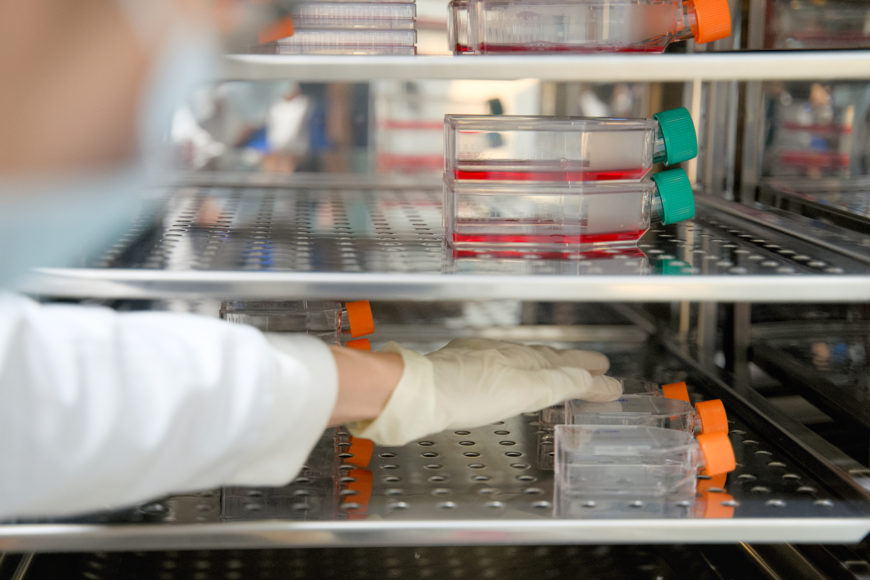
CO2 gas mixers are essential equipment throughout biological research and industrial biotechnology. In this article, we look at the applications and advantages of CO2 gas mixers and see why they offer advantages over pre-mixed gas supplies.
All living organisms depend on the exchange of gasses with their environments. Animals and most bacteria respire, using oxygen from the environment to extract energy from carbon-based molecules and release carbon dioxide. Plants return the favor through photosynthesis, fixing carbon from atmospheric carbon dioxide into energy-dense organic molecules with the help of sunlight, and producing oxygen.
Even small fluctuations in the concentrations of atmospheric gasses such as carbon dioxide and oxygen can profoundly affect the functioning of various organisms – whether single-celled or complex.
As a result, controlling atmospheric composition is a fundamental concern for the biological sciences, both in the lab and in industry. CO2 gas mixers and other gas mixing systems are vital in enabling researchers and engineers to precisely tune atmospheric composition and provide optimal conditions for biological research and processing.
Dynamic CO2 gas mixers are self-regulating devices capable of providing extremely accurate gas mixes. They use components known as mass flow controllers to continuously monitor and adjust gas flow composition, enabling extremely precise preparation of gas mixtures on demand – making them indispensable in biology.
Applications of CO2 Gas Mixers in Biology
Carbon dioxide is one of the most important gasses for biological systems – so CO2 gas mixers are important in biology. Using a CO2 gas mixer instead of canisters of pre-mixed gasses not only saves money in the long run but enables increased control over atmospheric composition – something which is essential in biological processing and research.
CO2 Gas Mixers in Industry and Production
As biotechnology-based approaches become more and more common in industry, CO2 gas mixers are increasingly being used to provide optimal conditions for biological processing. One of the most prevalent applications is the production of pharmaceutical compounds in bioreactors. In these applications, microbial metabolisms (commonly those of yeasts or bacteria) are harnessed in bioreactors to convert feedstock chemicals into active pharmaceutical ingredients.
The atmospheric composition within a bioreactor is a crucial parameter in these applications: CO2 gas mixers enable biological processes to be fine-tuned for productivity and efficiency. CO2 gas mixers will commonly be used in conjunction with gas monitoring systems to provide a steady-state environment that maximizes bioreactor productivity.
Other industrial applications of CO2 gas mixers include controlled atmospheres in clean rooms or glove boxes. CO2 gas mixers may also be used to provide modified atmospheres for packaging, for example in the food industry to prevent spoilage.
CO2 Gas Mixers in Biological Research
CO2 gas mixers are also vital throughout biosciences research, where CO2 concentration is a common control variable, independent variable, or dependent variable in experiments of all kinds.
For example, enrichment studies are a common type of experiment in which a diverse community of microorganisms is exposed to some type of environmental pressure in order to study the dynamic behavior of the community. In these experiments, CO2 gas mixers are vital: both to hold the CO2 concentration at a constant level, and to vary the CO2 levels to explore the effects on microbial activity.
CO2 gas mixers provide a reliable and flexible way to study the effects of atmospheric composition on organic systems ranging from animal cell cultures to microalgal communities.3,4
Environics CO2 Gas Mixers
Environics is a world-leading provider of CO2 gas mixers for applications both in industry and academia. Our gas mixing technology is based on very precise control of thermal mass flow controllers, enabling us to deliver CO2 gas mixers with unparalleled performance. Our CO2 gas mixers offer accuracy better than +/- 1% and repeatability of +/- .05% of setpoint, making them perfect for the most exacting biological research applications
To find out more about our CO2 gas mixers and other precision gas mixing systems, get in touch with a member of the Environics team today.
References and Further Reading
1. Kader, A. A. & Saltveit, M. E. Respiration and Gas Exchange. in Postharvest Physiology and Pathology of Vegetables (CRC Press, 2002).
2. Pereira, J. S. Gas Exchange and Growth. in Ecophysiology of Photosynthesis (eds. Schulze, E.-D. & Caldwell, M. M.) 147–181 (Springer, 1995). doi:10.1007/978-3-642-79354-7_8.
3. Yao, T. & Asayama, Y. Animal-cell culture media: History, characteristics, and current issues. Reproductive Medicine and Biology 16, 99–117 (2017).
4. Eloka-Eboka, A. C. & Inambao, F. L. Effects of CO2 sequestration on lipid and biomass productivity in microalgal biomass production. Applied Energy 195, 1100–1111 (2017).

